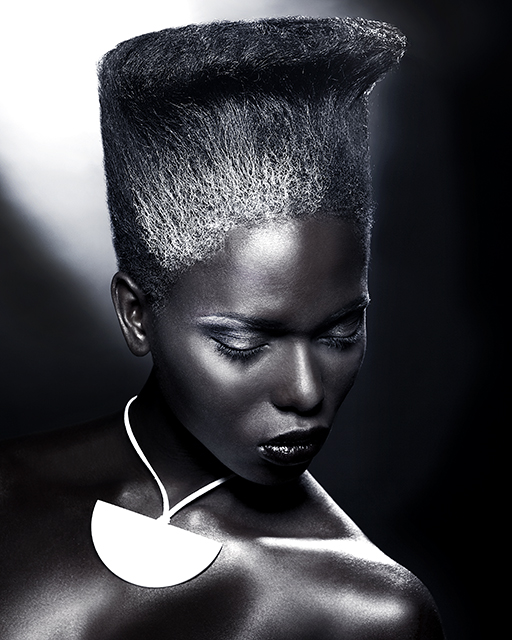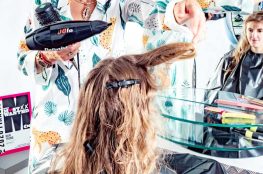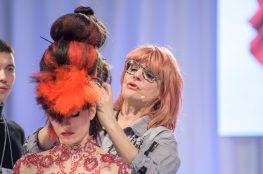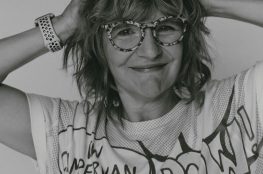Recently I have been watching Peaky Blinders (I mean, it was about time…). As I made my way through the latest season, which is historically set in the build up to WWII, I find it sort of scary how I can draw so many parallels to the political climate back then, and the political climate right now! Which brought me to think of the industry that we work in, and how the hair and fashion worlds still have leaps and bounds to go before to fix issues of “institutionalised” racism.
However, as a white female, I can do research, and find the numbers, but what I can’t do is authentically convey and tell a true story about how this racism has made me feel, because it is not something I have lived through. So I asked a friend of mine, Kayla Candence, to write about her experience of the haIr industry in the UK. Kayla has afro hair, often styled in thin gorgeous dread locks. And this is what she has to say:

“We sit and watch as the world celebrates black hair… on our white counterparts. Yet in some parts of the world, we our still fighting to be able to wear our natural hair to work. Supermarkets are locking up products for black hair and schools are allowed to ban dreadlocks. And yet we see the way black style influences many industries.
I ’d never really thought about my hair, and who does it. Growing up a lot of my hair was done by my mother or other members of the family. I think I’ve been to the hairdressers, for my own hair, once in my life. I was young, I’d noticed that most of the people in the salon looked like me. Their hair texture was closer to mine, the styles they were getting were styles which I recognised; I’d grown up around them. At one time, we had a specific hairdresser, that did all of our locks. However, as I have grown older, I find it easier to do my own hair. Something that I will always take from my hair journey, is the excitement I felt when we found a person who could do my hair. It was never as simple as, leaving to go to any of the four salons on one street.
As black women, we have been told that our hair is bad. We’ve been sold relaxers, weaves, wigs… We’ve been told our styles are too ghetto, unprofessional. Yet when celebrities, influencers, style icons, wear their hair in cornrows, braids, twists, locks, then suddenly it becomes fashionable and acceptable. It turns into a ‘new’ and exciting trend that seems to captivate all who lay their eyes upon it. Of course, I use the term ‘new’ with a gallon of salt, because these styles are not new, they’re not part of an undiscovered style; they’re the styles we’ve been rocking for decades! We have been told that our hair doesn’t matter. Even in 2020 we are still seeing black artists in the film/modelling/performance industry; still having to do their own hair on set. The hair industry is not lacking in hairdressers and stylists for black hair; so why are big and successful studios skipping out on finding appropriate stylists for black hair?
Why are people so afraid of black hair? Simply put its lack of understanding. Our hair is still so alien to so many. The industry’s blatant disregard of black hair is evident in the training curriculum. It’s knowing that even though my good friend is a wonderful hairdresser, I will never be able to make use of cheaper appointments at her hands; not unless she chooses to learn how to work with black hair texture at her own expense. It’s a specialty to work with black hair. Not a necessary part of learning and not a mandatory part of the course. Because as we know. Black hair is not important, only its style and influence is.”
And there it is, last paragraph! Learning how to work with Afro hair is not a necessary skill in UK college courses. You do not need to know how to handle afro hair in order to get your level 3, so most salon apprenticeships don’t other teaching it: and this is not ok. To be a fully qualified hairdresser you should be able to work with all types of hair. Which is why at Anne Veck we train all our staff to work with afro hair, and if we feel like we need more training, we simply do more training. Saying you don’t do afro hair is like saying you don’t do blondes, totally non-sensical in todays society. In light of the Black Lives Matter protests this year clients expect us (and rightly so) to be knowledgeable on all hair types, and here at Anne Veck we strive to be, so that everyone an feel welcome in our salon.

Anne recently answered some further Q&A about her salon and afro hair, so if you have a moment, read on to see exactly what she has to say !
-When in your career did your interest in textured hair begin?
When I opened my own salon back in 1991.. I had a lot of demand and I became increasingly uncomfortable and frustrated to admit that I couldn’t deal with every type of hair
-What action did you take to learn more about textured hair? Please detail your journey.
First I bought an NVQ book on Afro caribbean hair, I attended an afro hair event at Alexandra Palace…and eventually I did an exchange of trade with my friend Samantha Golding who owns SG Hair in Birmingham and is an expert. We have also bought in training or I have gone on courses with experts including MK and Charlotte Mensah.
-Why did you feel it was important to learn about textured hair?
If you call yourself a hairdresser you need to deal with every type of hair. If you don’t do textured hair it’s like saying you don’t do blondes… Also we live in a multi cultural society and X% of clients are of mixed heritage…..
-How did you go about up skilling your team to understand and be competent in cutting/styling textured hair?
We just had repeat training until we felt confident we were good enough to charge for the service
-Why do you think it’s important for a salon to diversify its services?
So you don’t lose out on lucrative services and, of course, to be ethical. By not offering to do textured hair, you are, in effect, acting in a racist way.
-What has been the reaction (good/or bad) to your salon diversifying its services to include textured hair?
Some of my staff were reluctant to learn. I think more from fear than anything else. And you also need to educate client and staff about charging the right price for the service. Overall, though, all good.
-What is your call for action for other salons around diversifying services and embracing textured hair?
Just go for it. It’s a journey but persevere as it won’t happen overnight. With regard to training, insist that your apprentices train on models with textured hair.
-Where does it start? Where can salons look to learn more about textured hair and to make sure they are catering for all in their salon?
Obviously there is a wealth of info online and in print. I benefitted enormously by partnering with Samantha Golding, so I recommend asking for help and maybe doing a skills swap, which is what we did and still do. ( Textured hair skills for styling and avant-garde in our example. ) As I keep saying here! insist your apprentices do textured hair and are assessed on it at the end point asessment.
What support exists for salons/stylists on a textured hair journey? see above
-What are your thoughts on products for textured hair – are brands doing enough? Brands you like/rate etc?
I think it would be nice to see more big brands catering for all hair types. Textured hair requirs products which are much more moisturizing…and education is very important . Textured hair can’t be managed without the right product. In the salon we use Avlon, fabulous products!
-Servicing a client with textured hair – what is your advice, how do stylists approach these appointments. Is it different to clients with Caucasian/European hair?
Be methodical about it. Section the head in 4 quarters and deal with one section at the time. Practice practice practice so when it comes to charging for your services you’re confident about it.
-What impact has the Black Lives Matter movement (recent awareness) and the Natural Hair movement had on diversifying service in salons? What do clients expect?
Clients expect you to be knowledgeable in all hair types. It is quite easy to train yourself these days with lots of instagram and youtube videos available to both stylist and client alike. Make sure your apprentices train on models with textured hair and that they are assessed on them. Black hair is not an option it is a necessity.
Article by Dirty French Girl
www.dirtyfrenchgirl.com





